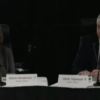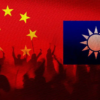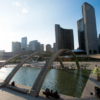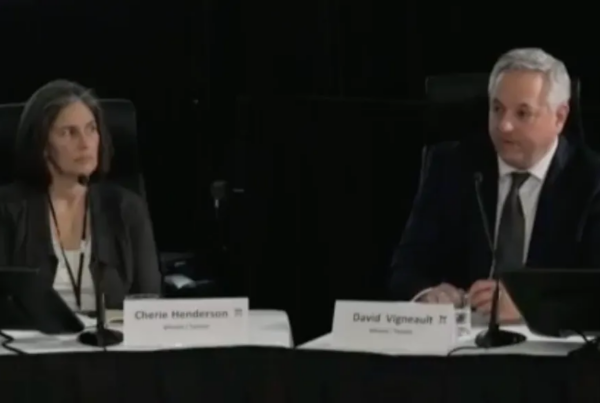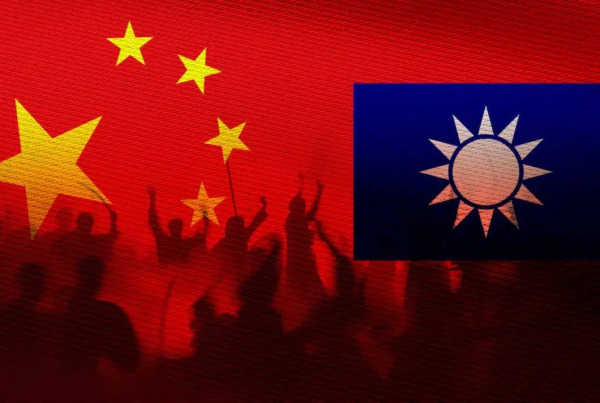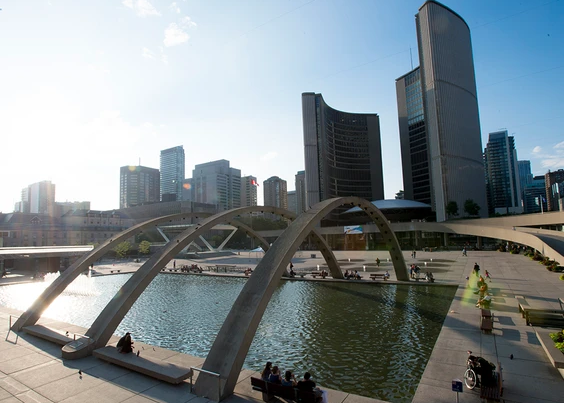“Better to be a dog in a peaceful time, than to be a human in a chaotic period.” (Feng Menglong, 1627)
Canadian Foreign Policy: Who Do We Think We Are?
Canadians have selected a new government and as such they have chosen a different foreign policy course for the country, presumably from a different perspective on how they view themselves on the world stage. Mr. Trudeau has stated that “Canada was back” and that he was committed to “restore Canadian leadership in the world”. But the key question, of course, is what the government will do to effect that restoration.
But back from what and to what? In fact, surprisingly, most of the reputation of Canada in the world comes from our contribution as allies during both World War I and II. But our maturing as a significant economic and military power in 1945 did not bring us any leverage with the Big Three, which might explain in part our infatuation with multilateralism as a better means for leveraging with others against the mightier ones.
The question today is what vision have Canadians today of their country’s role in the world in light of the deeply altered international environment. Is our relative absence on the international stage only due to ten years of a conservative instrumentalist agenda or also to an inescapable downward trend in our relevance?
And that altered environment today looks quite awful.
A Pretty Sad International Stage
Nearly 30 years ago, with the fall of the Berlin Wall and the subsequent end of the Cold War, we believed mankind was entering a new age. Today, the arc of instability never ceases to expand and to widen. Travel advisories by governments to their populations about places, regions and countries to avoid have multiplied. Consular affairs – i.e. the protection of one’s citizens abroad – have now become nearly the single most important program of foreign ministries. Terrorism had been striking everywhere and no country is immune. While ISIS’s expansion in Iraq and Syria appears to have been slowed, ISIS has clearly not been destroyed and now threatens to seek a foothold in Libya and elsewhere in Africa and the Middle East where it would rekindle the idea of reestablishing the caliphate in the former Abbasside Empire.
The Cold War seems to be back, at least in the eye of the Russian propaganda and NATO exercises, at the highest level. Crimea has been harpooned by
President Putin with little hope of ever returning to Ukraine which remains a combat zone in the East. It is no surprise that the three Baltic countries fear some form of hybrid warfare and intervention by Russia in the name of protecting Russian minorities in their midst. Some of the other East European countries are increasingly concerned and cry for more NATO reassurances while others adopt political stances more in tune with that of the Kremlin – illiberalism.
The Western world has inherited intractable conflicts and the growth of nefarious non-state actors, terrorist groups and organized crime war from its interventions in Afghanistan, Iraq, and Libya. While some very modest hopes are starting to emerge from the Kerry/Lavrov ++ consultations, Syria has entered its 5th year of civil war with nearly half a million deaths, countless injured and millions of refugees flooding Europe. Mr. Putin’s role in unleashing aerial bombardments against opponents of President Assad can be interpreted in many ways – a bargaining chip to remove the Ukraine-inspired sanctions, a reassertion of its role in the Middle East, divide the Alliance, notably with respect to Turkey, or, even more ominous, between the US adamant not to allow Russia’s encroachment to go any further, and the Europeans, particularly those abutting the Mediterranean Sea, who hope to see in Russia’s entry into the fray in Syria as ultimately opening the possibility of stemming the refugee flow.
But Putin is not doing anything to help the West. His main concern is the risk of more instability in the region generating more jihadist and terrorist attacks on Russian soil. He also has interests in maintaining a choke hold on natural gas deliveries to Europe. If he can get some benefits on Ukraine in exchange, he will pocket these as well. Turkey’s role in the conflict further muddles the situation in a dangerous way. As the EU High Representative, i.e. “Foreign minister”, Federica Mogherini puts it: “we risk a hot war among different actors than those we usually think of, not necessarily Russia and the United States, but Russia and Turkey which could be”.[1] While the Israeli-Palestinian conflict may still be on the international agenda, less and less people believe than any progress can be achieved despite the growing threat of a full blown Third Intifada. Yemen is the victim of a proxy war between Iran and Saudi Arabia, underscoring the growing divide between Sunni and Shia. Indeed, extremism and religious radicalism is aggressing conventional civilizational beliefs. As one scholar wrote, “the reform of Islam is shaping up to be the most important issue in political ideology of the twenty-first century.”[2]
For its part, Iran has concluded a solid nuclear deal with the West but its support for terrorist activities has not relented and it continues to expand its
missile capabilities. Prior to the signing of the final Comprehensive Program of Action, Saudi Arabia had even threatened to pursue the acquisition of nuclear missiles.
Experts focus on Chinese militarization of China Seas’ reefs when in fact the more worrisome development is its ever expanding military, notably at sea. The reefs may provide some form of forward base to China but would remain vulnerable targets in times of conflict. If one adds to all this North Korea’s mad pursuit of more nuclear capability, proliferation, long range missile development and cyber threats, the picture is singularly bleak.
Linking Canadian Foreign Policy Aspirations to the Present International Environment
From the mandate letters ….
The starting point, beyond “sunny days and sunny ways” in an era more characterized by the perfect storm, is Mr. Trudeau’s commitment of October 20, 2015, to the return to a more “compassionate” and internationalist Canada. To the extent that the Prime Minister has not called for a foreign policy review but has instructed his Minister of Defence to launch a thorough defence policy review, we are limited to taking into account the mandate letters – their publication was an excellent initiative – and various recent statements by the Prime Minister and the Ministers of the Portfolio.
While the mandate letters certainly do not convey a sense that the world is facing some enormous challenges, they clearly intimate an activist foreign
policy and offer a framework within which the government will articulate policy responses to events and crises in the international arena. The mandate letters for Foreign Affairs and Trade emphasize restoring constructive Canadian leadership in the world by revitalizing its diplomacy and leadership on key international issues.; improving relations with the United States, including making progress to reduce impediments to trade and commerce, as well as strengthening the trilateral cooperation with the US and Mexico; and reinforcing the linkage between defence policy, foreign policy and national security. More specifically, it advocates working with the Minister of National Defence (MND) to increase Canada’s support for United Nations peace operations.
The National Defence mandate letter reiterates the need for a link between defence policy, foreign policy, and national security, underpinned by the “overarching goal” of ensuring that “the Canadian Armed Forces are equipped and prepared, if called upon, to protect Canadian sovereignty, defend North America, provide disaster relief, conduct search and rescue, support United Nations peace operations and contribute to security of our allies and to allied and coalition operations abroad.” At the same time, the letter calls for a new defence strategy to replace the 2008 CFDS. More specifically, in addition to calling for the ending of Canada’s combat mission in Iraq and Syria, with a refocus on training and humanitarian support, the letter commits to maintaining current defence spending, including planned increases, to the launching of an open and transparent competition to replace the CF-18 fighter aircraft; to renewing Canada’s commitment to UN peace operations; to leading international efforts in training personnel for UN missions; to maintaining existing pledges to NATO and the North American Aerospace Defence Command (NORAD); and to renewing focus on surveillance/control over territory, including the Arctic, and reviewing measures against cyber threats.
While the letters provide a broad perspective on the government’s priorities, they are rather short on specifics. There is less emphasis on the security risks per se and more on collective responses, a contrasting perspective to the preceding government’s policies. Yet, taken together, these letters offer a foundation for a truly integrated international policy review and a national security strategy.
… to a re-energized presence on the international stage…
There are many areas where Canada will not make a difference – and that is not a flaw. This only reflects who we are, what our assets are and how the
combination of our values and interests play out in the broader context of our geopolitical location.
But based on our assets and the government’s outlook, there are things Canada can do. For instance, the government could implement a series of decisions linked to its commitment to a renewed approach to multilateralism, starting with:
- Rejoining the UN Convention to Combat Desertification.
- Signing on to the UN Declaration on the Rights of Indigenous People.
- Signing on to several UN resolutions such as the right to safe water and sanitation.
- Ratifying UN treaties affecting the rights of children, persons with disabilities, economic, social and cultural rights, as well as on enforced disappearances and on migrant workers.
- Taking a more open-minded approach at the next Universal Periodic Review of Canada at the Human Rights Council in Geneva and responding substantively to any sensible recommendation.
- Reversing its diffident approach to UN Special Rapporteurs coming to Canada to review our record on issues such as the right to food or the rights of children.
- Ratifying the American Convention on Human Rights;
- Convening the Federal, provincial, territorial ministerial human rights meeting (the last one was in 1988!) to provide impetus and leadership at home on commitments we make abroad.[1]
- Championing the UN Peacebuilding Commission, given its essential role in preventing countries and regions in conflict from falling back into conflict.
- Adding Canada’s voice to those who wish to eliminate the recourse to the veto power by the permanent members of the Security Council on humanitarian issues.
- Leading efforts in redefining R2P, notably in terms of refugee policy.
- Strengthening and deepening the functional/geographic model of diplomatic action offered by the Commonwealth and La Francophonie.
- In the spirit of Canada hosting the Global Centre for Pluralism established by the Aga Khan in Ottawa, foster a pluralist approach against the growing exclusivism of our societies. Indeed, Canada should be at the forefront of the struggle against extremism, ethnic and religious radicalism.
- Ensuring that our official development assistance programs and budgets are in tune with all these efforts.
But the government will need to provide a clearer perspective of how multilateralism can be made more effective in this day and age.
… and now to the harder issues of war and peace.
The trends in the international situation we underlined, from a security and defence vantage point, translate into a series of specific international threats or challenges. The following scenarios are neither exhaustive nor based on priority ranking. But these examples should form the heart of any integrated geostrategic thinking about foreign policy, security, and defence.[4]
- Further Russian incursions in Ukraine and pressure on neighbouring NATO countries. It should come as no surprise that whatever Canada does has to be geared towards, and in sync with our NATO allies. It could entail doing more under Operation Reassurance and within the multinational training mission in Ukraine (Operation Unifier). More broadly, were NATO members of Eastern Europe or the Baltics to become under more pressure from some form of Russian hybrid warfare or destabilization, Canada would want to be engaged more forcibly. Meanwhile, we might wish to review the decision to withdraw from NATO’s Airborne Warning and Control System (AWACS) and the Alliance Ground Surveillance (AGS) program.
- Russian pressure on the Arctic. Security is not within the purview of the Arctic Council. Russia recently conducted huge manoeuvres in its Arctic territory but failed to advise neighbours. Some informal mechanism ought to be created to allow consultation. Any forceful pressure would entail automatic consultation and response within NATO, particularly between the four Western Arctic countries – Canada, US, Denmark, and Norway.
- North Korean nuclear tests, threats and possible aggression against the US, Japan or South Korea. As one of the combatants in the Korean War, Canada will have to assess what contribution and force generation effort might be necessary in such a scenario in support of the US and allies. Alternatively, a regime collapse in North Korea could lead to civil war and nuclear “diversionary” attacks abroad. While unlikely to be directly involved, Canada could provide full support to efforts countering such attacks.
- Given the dangers of “rogue states” armed with nuclear weapons and long-range delivery systems, Canada should consider opening discussions with the US on joining continental Ballistic Missile Defence (BMD)
- ISIS in all its ramifications/partners/competitors. Canada needs to reinforce intelligence sharing with key NATO partners, notably France which could potentially become part of our “Five Eyes” community.
- On the Israeli-Palestinian conflict, in the event of a peace agreement, we would want to volunteer military observers along the Jordan River.
- 3rd Intifada exploding out of control. Canada would want to join diplomatic efforts to foster the creation of a Palestinian state within the parameters of long-standing UN resolutions, which assumes nullifying the nefarious impact of Hamas.
- Canada would be among the first to urge the reimposition of sanctions in the case of a failing on the part of Iran in the implementation of the nuclear agreement.
- The resumption of relations with Iran might provide Canada with more leverage on Iran. Meanwhile we should support Lebanon’s stability.
- In response to potential growing tension in the South and East China Seas, Canada should be supportive of US efforts – we have been very quiet on this in the recent past. Canada also needs to build its credentials with the other countries of the region.
- Were the Afghan government to crumble at the hands of a resurgent Taliban, there would be security implications for Pakistan. Canada could contribute to strengthening the anti-terrorist capabilities of the Pakistani law enforcement institutions by making them fully accountable.
- Failure of fledgling peace talks between India and Pakistan. Any action would be through the Commonwealth.
- Proliferation of Pakistan nuclear weapons into the hands of terrorist groups. This would become a major international crisis. Canada should try to prevent such an outcome by strengthening its involvement in the Proliferation Security Initiative and continuing to work alongside its allies – not least the US – on other nuclear security initiatives.
- Evolution of military technologies, from cyber threats and autonomous vehicles. Canada would work in tandem with the US and within NATO.
- An attack against an Alliance member, for instance ISIS, Syria or even Russia against Turkey. If Article 5 of the NATO Charter was invoked, any contribution would be decided collectively and Canada would play the part it would feel capable of providing.
- Piracy at sea. Canada made a stellar contribution with its naval deployments to the Combined Maritime Forces coalition patrolling the Indian Ocean, Red Sea, Gulf of Oman, and Gulf of Aden. The focus now is on enhancing the capabilities of local coast guards.
There are many other foreign issues which we have not touched upon, such as a Canadian Asia policy, notably China, the updating of its Latin America
Strategy, the renewed commitment towards Africa. What is critical at this juncture, in addition to the renewed commitment to the UN, is the maintenance of all existing defence commitments in North America (NORAD) and Europe (NATO), both institutions being the backbone of Canada’s foreign, security and defence policy. In addition to joining continental BMD, we might want to “test the waters” of a full maritime NORAD. In the face of the range of threats which were listed “casually” in this paper, the Atlantic Alliance is more important than ever as it not only unites our collective defence and deterrence capabilities but it underscores our civilizational unity, come hell or high water.

